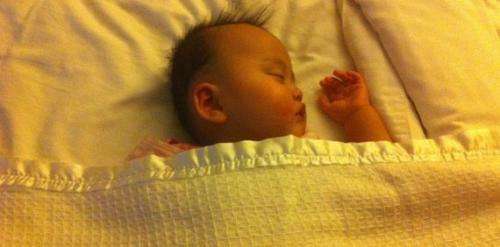Researcher offers parents practical ways to improve sleep without turning to drugs

Good night, sleep tight! It's something many parents say to their kids every evening. But very few people always find it easy to get a good night's rest, according to a sleep and pain expert at the University of Alberta.
"Twenty-five to 40 per cent of children will at some point have a sleep problem," says Cary Brown, an associate professor in the Faculty of Rehabilitation Medicine. "Though many will grow out of it, for those who do not, sleep deficiency has a strong influence on function, development, learning, growth and emotion.
"People tend to turn to pills too soon, when actually there are many environmental modifications that can be done to help kids and parents go to sleep, and sleep well," says Brown.
That's why Brown wants to promote non-pharmacological sleep interventions, or NPSIs. She is hosting a free public workshop, Sleep and Pain 101, to help people understand the science of sleep and learn practical strategies to help improve sleep without resorting to drugs.
Creating a restful room
"Believe it or not, washing and changing your bedding frequently may help you sleep better," says Brown. "Sheets and duvets tend to collect dust mites that may contribute to respiratory problems and breathing. This may be affecting people and their sleep without their even realizing it."
Brown recommends changing your bedding at least once every two weeks (once a week is best) and putting pillows and duvets in the dryer once a week.
"Blast them with heat to get rid of dust mites. Dust interferes with breathing and can cause dry mouth and congestion, making it uncomfortable to sleep."
Brown says the most important thing is to try to reduce light exposure at night.
"Illuminance over 30 lux suppresses melatonin, the hormone for sleep. A small screen on a tablet is already generally 40 lux," she explains. "So turn off the TV, turn off mobile devices and laptops, and close the door to your bedroom if the light is kept on in the hallway. The same goes for kids, because once light hits, it's telling your body to stay awake, and you're not getting the deep sleep you need."
Sound also makes a difference when it comes to sleep.
"Anything over 30 decibels can affect sleep. A normal conversation is about 60 decibels, so try to keep the noise down, especially for children who hopefully go to bed before their parents."
Brown recommends background white noise to help drown out sound that could interrupt sleep.
"Try turning on the fan. Avoid music, even ocean music that's advertised as white noise, because if the pitch changes, it can still interfere with sleep."
Brown says temperature can also affect sleep. "Our core temperature needs to drop right before we go to sleep or else we cannot get to sleep. That's why it's nice to give your child a warm bath before bed. The body temperature warms up and then cools down right before they go to bed."
Sleep deprivation is often overlooked when it comes to behavioural problems and chronic conditions and how to treat them.
"Sometimes implementing an NPSI and creating an environment conducive to good sleep can make all the difference—for parents and children. As we age, our need to sleep remains the same but our ability to sleep well changes. There's a decline of 30 minutes per decade after age 50," Brown says.
The study was published in the journal Disability and Rehabilitation.
Resources for better sleep
Register for Sleep and Pain 101. This free public event on Oct. 26 will focus on sleep and pain, and why sleep is an important part of pain management. It will also include information on practical tools to improve sleep.
Parents, teachers and health-care providers can find free sleep resources at sleepright.ualberta.ca.
More information: informahealthcare.com/doi/abs/ … 09638288.2012.723788


















